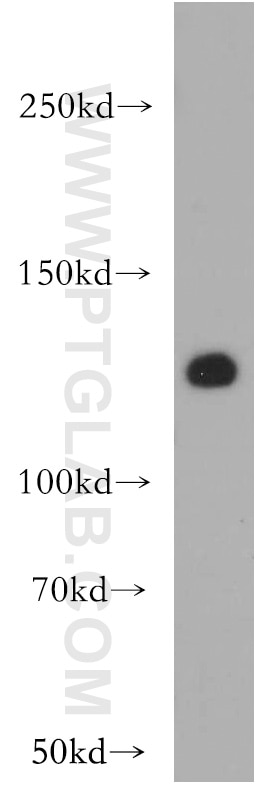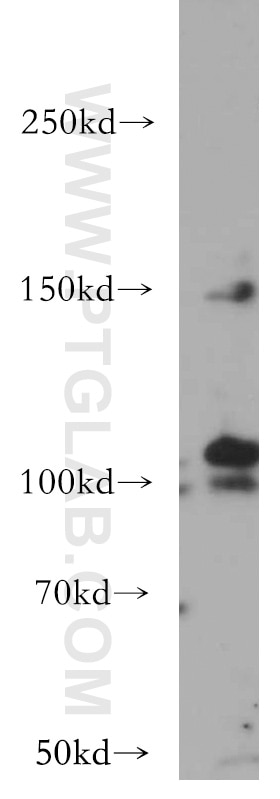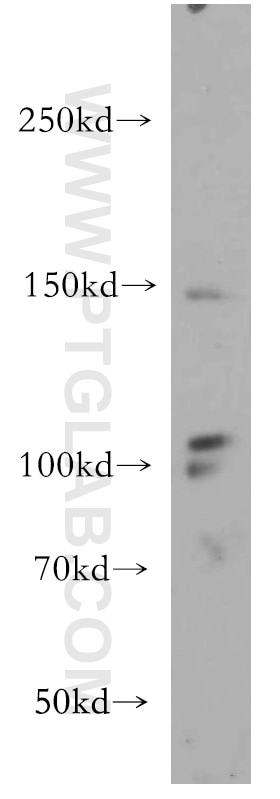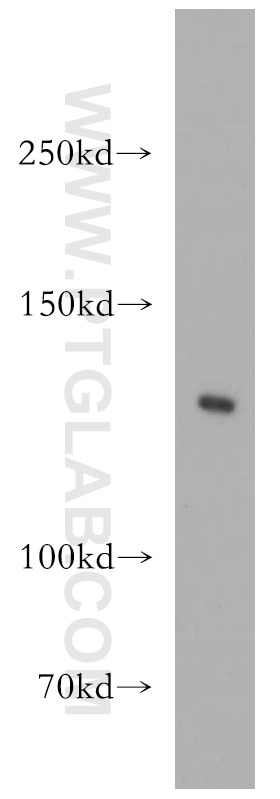Anticorps Polyclonal de lapin anti-VEGFR3/FLT4
VEGFR3/FLT4 Polyclonal Antibody for WB, ELISA
Hôte / Isotype
Lapin / IgG
Réactivité testée
Humain, souris
Applications
WB, IHC, IF, ELISA
Conjugaison
Non conjugué
N° de cat : 20712-1-AP
Synonymes
Galerie de données de validation
Applications testées
| Résultats positifs en WB | tissu splénique de souris, cellules HeLa, cellules PC-3, tissu cardiaque de souris |
Dilution recommandée
| Application | Dilution |
|---|---|
| Western Blot (WB) | WB : 1:200-1:1000 |
| It is recommended that this reagent should be titrated in each testing system to obtain optimal results. | |
| Sample-dependent, check data in validation data gallery | |
Applications publiées
| KD/KO | See 1 publications below |
| WB | See 13 publications below |
| IHC | See 2 publications below |
| IF | See 1 publications below |
Informations sur le produit
20712-1-AP cible VEGFR3/FLT4 dans les applications de WB, IHC, IF, ELISA et montre une réactivité avec des échantillons Humain, souris
| Réactivité | Humain, souris |
| Réactivité citée | Humain, souris |
| Hôte / Isotype | Lapin / IgG |
| Clonalité | Polyclonal |
| Type | Anticorps |
| Immunogène | Peptide |
| Nom complet | fms-related tyrosine kinase 4 |
| Masse moléculaire calculée | 153 kDa |
| Poids moléculaire observé | 125 kDa |
| Numéro d’acquisition GenBank | NM_002020 |
| Symbole du gène | FLT4 |
| Identification du gène (NCBI) | 2324 |
| Conjugaison | Non conjugué |
| Forme | Liquide |
| Méthode de purification | Purification par affinité contre l'antigène |
| Tampon de stockage | PBS with 0.02% sodium azide and 50% glycerol |
| Conditions de stockage | Stocker à -20°C. Stable pendant un an après l'expédition. L'aliquotage n'est pas nécessaire pour le stockage à -20oC Les 20ul contiennent 0,1% de BSA. |
Informations générales
FLT4, also named VEGFR-3, belongs to the protein kinase superfamily, Tyr protein kinase family, and CSF-1/PDGF receptor subfamily. It is a receptor for VEGFC. FLT4 has a tyrosine-protein kinase activity. Defects in FLT4 cause lymphedema hereditary type 1 (LYH1A). Defects in FLT4 are found in juvenile hemangioma. VEGFR-3 is a highly glycosylated protein and migrates as bands with different molecular weights: an ~175 kDa precursor, an ~195 kDa mature form, an ~140 kDa non-glycosylated backbone, and a form that appears to be partially cleaved proteolytically in the extracellular domain to produce an ~125 kDa band(PMID: 15389531).
Protocole
| Product Specific Protocols | |
|---|---|
| WB protocol for VEGFR3/FLT4 antibody 20712-1-AP | Download protocol |
| Standard Protocols | |
|---|---|
| Click here to view our Standard Protocols |
Publications
| Species | Application | Title |
|---|---|---|
Mol Cancer m6A methylation reader IGF2BP2 activates endothelial cells to promote angiogenesis and metastasis of lung adenocarcinoma | ||
Int J Biol Sci PROTAC-Surufatinib Suppresses Pancreatic Neuroendocrine Neoplasms Progression by Inducing Ferroptosis through Inhibiting WNT/β-catenin Pathway Mediated by HMOX1 | ||
Front Oncol The Specifically Androgen-Regulated Gene (SARG) Promotes Papillary Thyroid Carcinoma (PTC) Lymphatic Metastasis Through Vascular Endothelial Growth Factor C (VEGF-C) and VEGF Receptor 3 (VEGFR-3) Axis. | ||
Stem Cell Res Ther Deer thymosin beta 10 functions as a novel factor for angiogenesis and chondrogenesis during antler growth and regeneration. | ||
Pharmaceuticals (Basel) Use of Early Donated COVID-19 Convalescent Plasma Is Optimal to Preserve the Integrity of Lymphatic Endothelial Cells. | ||
Mol Cell Endocrinol Long noncoding RNA GAS5 accelerates diabetic wound healing and promotes lymphangiogenesis via miR-217/Prox1 axis. |
Avis
The reviews below have been submitted by verified Proteintech customers who received an incentive for providing their feedback.
FH Shinford (Verified Customer) (12-15-2023) | We used the concentration of 1:500 to get a very strong band. It is a big volume set.
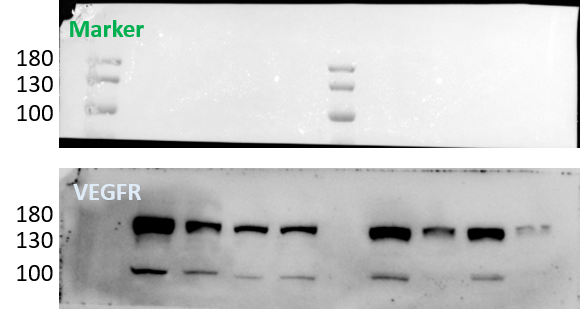 |
